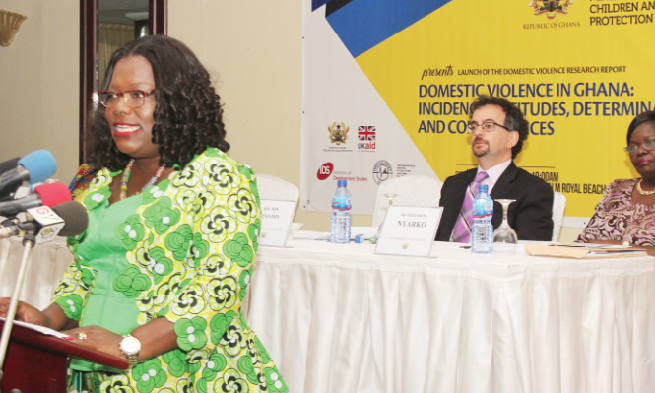
Ministry launches Domestic Violence Research Report
The Ministry of Gender, Children and Social Protection has launched the Domestic Violence Research Report to address gender based violence in Ghana.
The nationwide research, which was conducted by the Ministry in collaboration with the Institute of Development Studies (IDS), Ghana Statistical Service and funded by UK Aid, was titled, “Domestic Violence in Ghana: Incidence, Attitudes, Determinants and Consequences”.
It provided an in-depth understanding of the incidence and types of domestic violence, the determinants and consequences of domestic violence, the individual, household and community level attitude towards domestic violence and the use and access of victims to support services and institutions.
Landmark achievement
Launching the report, the Sector Minister, Nana Oye Lithur, said the exercise was a landmark achievement following the launch of the first ever nationwide study on violence against women in 1999.
She said the aim of the study was to provide an in-depth understanding of the incidence, attitudes, determinants and consequences of domestic violence among people aged between 15 and 60 years in Ghana.
She said domestic violence was one of the most pervasive violations of human rights in the world, yet one of the least reported and prosecuted and one of the greatest threats to lasting peace and development in the country.
Nana Oye stated that Ghana’s legislation to protect women from violence reflected the global momentum for women’s rights to be recognised as human rights post Beijing Declaration and Platform for Action of 1995 and the UN Declaration on Elimination of violence against women.
Gender inequalities
She said addressing gender inequalities had been given a prominent focus in the UN Sustainable Development Goals (SDGs) and with the development of the SDGs there had been a pledge to eliminate all forms of violence against women and girls in the public and private spheres.
Nana Oye said the government enacted the Domestic Violence Act (Act) 732 in February 2007 with the support of advocacy efforts by civil society organisations and women’s rights organisations, and this legislation had let to a progressive approach to address domestic violence.
Phenomenal increase
The minister said the report indicated that there had been a phenomenal increase in the reporting of cases since 1999, and that the Commission for Human Rights and Administrative Justice (CHRAJ) resolved 826 gender-related cases between 2011 and 2013 and refered 155.
She said the Domestic Violence Victims Support Unit (DOVVSU), established within the Ghana Police Service, recorded 54,415 cases of sexual and gender-based violence cases and 15, 885 cases of assault between 2011 and 2013
Nana Oye said after 20 years, nearly three out of 10 women, 28 per cent and two out of 10 men in Ghana had experienced domestic violence in 12 months prior to the study and many of the 4,995 respondents of the survey experienced multiple forms and types of violence as 71. 5 per cent of women and 71. 4 per cent of men reported experiencing some form of violence.
Forms of violence
“This study is unique and the first of its kind in Ghana. It provides gender disaggregated data on domestic violence in Ghana. So now we know that the commonest form of violence suffered by men in the country is psychological violence (7.9 per cent) and the least is sexual violence (1.4 per cent).
She called for the stepping up of efforts to protect the society against domestic violence as the statistics had not changed fundamentally from 1999 and that meant that Ghana had to be more aggressive in the fight to end domestic violence.
“As a Government, we are committed to encouraging initiatives such as this study that will enable us to address prevailing issues that hinder our development as a country. We will continue to support research work and innovation in all fields, including important areas such as domestic violence”, she said.
For his part, the British High Commissioner to Ghana, Mr Jon Benjamin, said the statistics on domestic violence was alarming and it showed how the rights of girls and women were violated in a manner that defeated the purpose of democracy.
He reaffirmed the UK’s commitment to address the issue in the areas of logistics and finance.
The Government Statistician, Dr Philomena Nyarko, said many segments of the society had been silent because “they see domestic violence as a family affair.”
She said the service had a more comprehensive information needed in order to address the challenges posed by domestic violence.
